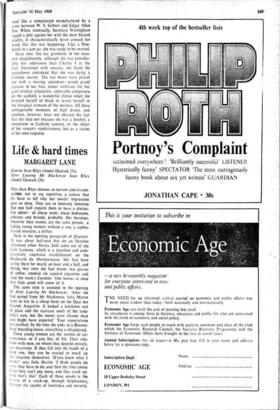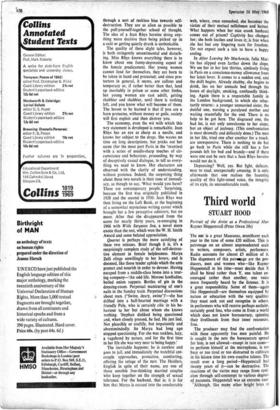Life & hard times
MARGARET LANE
Quartet Jean Rhys (Andre Deutsch 25s) After Leaving Mr Mackenzie Jean Rhys (Andre Deutsch 25s) Miss Jean Rhys chooses so narrow and circum- scribed, not to say repetitive, - a canvas that it's hard to tell why her novels' impression goes so deep. They are so intensely feminine that one half expects them to have a distinc- tive odour: of cheap scent, mean bedrooms, ashtrays and brandy, probably. Her heroines, whatever their names, are the same person: a fading young woman without a sou, a sophis- ticated innocent, a drifter.
Here is the opening paragraph of Quartet: 'It was about half-past five on an October afternoon when Marya Zelli came out of the Café Lavenue. which is a dignified and com- paratively. expensive. establishment on the Boulevard du Montparnasse. She had been sitting there for nearly an hour and a half, and during that time she had drunk two glasses of coffee, smoked six caporal .cigarettes and read the week's Candide.' One knows at once that little good will come of it.
The same note is sounded in the opening of After Leaving Mr Mackenzie: 'After she had parted from Mr Mackenzie, Julia Martin went to live in a cheap hotel on the Quai des Grands Augustins. It looked a lowdown sort of place and the staircase smelt of the land- lady's cats, but the rooms were cleaner than you might have- expected.' Your expectations are justified; by the time she sinks to a Blooms- bury boarding-house, everything is dilapidated.
These young women are the victims of cir- cumstance, or if you like, of life. Their rela- tions with men, on whom they depend entirely, are disastrous. If they fall into the hands of a kind one, they can be trusted to muck up the situation themselves. 'D'you know what I think?' says Julia Martin. 'I think people do %hat they have to do, and then the time comes %hen they can't any more, and they crack up. And that's that.' Each of these novels is the hiNtory of a crack-up, through helplessness,. throtuTh the apathy of loneliness and poverty, through a sort of reckless bias towards self- destruction. They are as alien as possible to the pull-yourself-together school of thought. The idea of a Jean Rhys heroine doing any- thing more decisive than being picked up in a café or getting quietly drunk is unthinkable.
The quality of these slight tales, however, is both stringently unsentimental and disturb- ing. Miss Rhys knows everything there is to know about one funny-depressing aspect of the female predicament. Her young women cannot fend for themselves, they are born to be taken in hand and protected; and since pro- tectors in general, it seems, are callous and temporary or, if rather better than that, land up inevitably in prison or some other limbo, her young women are cast adrift, getting shabbier and shabbier, until there is nothing left, and you know what will become of them. The lesson to be learned is that if you are a born protectee, without money or guile, society will first exploit and then destroy you.
The economy, even the wit with which this wry statement is developed is remarkable. Jean Rhys has an eye as sharp as a needle, and knows her subject to the dregs. She wastes no time on long descriptions, but pricks out her scene (for the most part Paris in the 'twenties) with a series of needle-sharp touches of cir- cumstance and behaviour, proceeding, by way of deceptively casual dialogue, to tell us every- thing we need to know. Her characters are observed with the clarity of understanding, without pretence. Indeed, the surprising thing about these two novels is their tone of immedi- acy, as though to say, 'What would you have? These are contemporary people.' Surprising, because the first was originally published in 1928 and the second in 1930. Jean Rhys was then living on the Left Bank, at the beginning of a somewhat mysterious writing career which brought her a few perceptive admirers, but no more. After that she disappeared from the scene for nearly thirty years, re-emerging in 1966 with Wide Sargasso Sea, a novel more exotic than the rest, which won the W. H. Smith Award and some belated appreciation.
Quartet is perhaps the more satisfying of these two reissues. Brief though it is, it's a surprisingly complete study of the self-destruc- tive element in female helplessness. Marya Zelli clings unwillingly to her lovers, and is doomed, like those tender aphids which the ants protect and nourish in order to devour. Having escaped from a middle-class home into a tour- ing company--`An odd life. Morose landladies, boiled onion suppers. Bottles of gin in the dressing-room. Perpetual manicuring of one's nails in the Sunday train. Perpetual discussions about men. ("Swine, deary, swine")'—she has drifted into a half-hearted marriage with a friendly Pole, who is certainly chic in his be- haviour to her but about whom she knows nothing. 'Stephan disliked being questioned and, when closely pressed, he lied. He just lied. Not plausibly or craftily, but impatiently and absentmindedly. So Marya had long ago stopped questioning. For she was reckless, lazy, a vagabond by nature, and for the first time in her life she was very near to being happy.'
The inevitable happens; he is careless and goes to jail, and immediately the watchful ant- couple approaches, protective, comforting, offering the refuge of the nest. The Heidlers, English in spite of their name, are one of those sensible free-thinking married couples who keep together on the strength of sexual tolerance. For the husband, that is; it is for him that Marya is coaxed into the comfortable
web, where, once enmeshed, she becomes the victim of their mutual selfishness and hatred. What happens when her nice crook husband comes out of prison? Captivity has changed her; she both loathes and loves it; is free when she has lost any lingering taste for freedom. Do not expect such a tale to have a happy ending.
In After Leaving Mr Mackenzie, Julia Mar- tin has slipped even farther down the slope. We see her in her late thirties, aimlessly living in Paris on a conscience-money allowance from her latest lover. It comes to a sudden end, and the drift begins. Already shabby, she begins to drink, lies on her unmade bed through the hours of daylight, smoking, confusedly think- ing. Again there is a respectable family in the London background, to which she reluc- tantly returns: a younger unmarried sister, the dutiful one, nursing a paralysed mother and waiting resentfully for the end. There is no help to be got here. The disgraced one, the bad lot, is not only unwelcome to her sister, but an object of jealousy. (This confrontation is most shrewdly and delicately done.) The men in her life, tried one after another for a touch, are unresponsive. There is nothing to do but go back to Paris while she still has a few pounds left for bed and brandy—and if there were one can be sure that a Jean Rhys heroine would not do it.
Depressing? Well, yes. But light, delicate, easy to read, unexpectedly amusing. It is only afterwards that one realises the haunting quality of this light-toned voice, the integrity of its style, its uncomfortable truth.







































 Previous page
Previous page